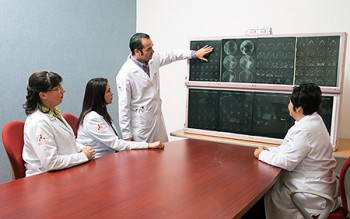
Brain cancer is one of the more difficult forms to treat, with the last advancement dating back more than 10 years. Today scientists are excited about the potential of tumor-treating fields (TTFields) as a means of “shocking” cancer cells.
Putting a “Charge” into Cancer
TTFields were first approved as a cancer treatment by the US Food and Drug Administration in 2011. The method of sending mild electrical fields through the scalp was originally used to treat glioblastoma, the most aggressive form of brain cancer that carries a two-year survival rate of approximately 30 percent.
NovoCure’s device, Optune, is a patient-controlled system that uses adhesive patches to deliver low-electric fields with a frequency of 200 kHz. The fields pulse through the skin, where they are thought to block the division of cancer cells.
TTFields in Action
There have been several subsequent trials of Optune that have generated positive results, but the most recent trial has been described as “landmark.” Neurologist Roger Stupp of Northwestern University led a group of researchers in a five-year study of patients newly diagnosed with glioblastoma.
Out of 695 participants, one-third were treated with oral chemotherapy alone while the other two-thirds had the oral treatment coupled with the Optune device. The two-, three-, four- and five-year survival rates were all significantly higher for the group that received the combination treatment.
Issels®: The Leader in State-of-the-Art Cancer Treatment
We’ve seen a significant number of patients achieve long-term remission after receiving our integrative immunotherapy programs. Contact us today to learn how Issels® has been ahead of the industry in the use of individually-developed immunotherapy protocols for cancer treatment.





